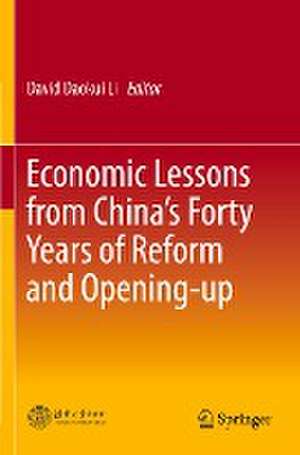Economic Lessons from China’s Forty Years of Reform and Opening-up
Editat de David Daokui Lien Limba Engleză Paperback – 29 mar 2022
Overall, the main lesson from China's past 40 years of reform and opening up is that proper incentives and behavior of the government, local and central, are important for economic growth. China has been conducting reforms in this regard and as a result, the government more or less has been playing the role of a "helping hand" regarding economic growth, although China's economic system is far from perfect and many reforms are still needed.
| Toate formatele și edițiile | Preț | Express |
|---|---|---|
| Paperback (1) | 779.57 lei 6-8 săpt. | |
| Springer Nature Singapore – 29 mar 2022 | 779.57 lei 6-8 săpt. | |
| Hardback (1) | 785.55 lei 6-8 săpt. | |
| Springer Nature Singapore – 27 mar 2021 | 785.55 lei 6-8 săpt. |
Preț: 779.57 lei
Preț vechi: 950.70 lei
-18% Nou
Puncte Express: 1169
Preț estimativ în valută:
149.19€ • 155.18$ • 123.16£
149.19€ • 155.18$ • 123.16£
Carte tipărită la comandă
Livrare economică 15-29 aprilie
Preluare comenzi: 021 569.72.76
Specificații
ISBN-13: 9789813345225
ISBN-10: 9813345225
Ilustrații: IX, 251 p. 100 illus., 98 illus. in color.
Dimensiuni: 155 x 235 mm
Greutate: 0.37 kg
Ediția:1st ed. 2021
Editura: Springer Nature Singapore
Colecția Springer
Locul publicării:Singapore, Singapore
ISBN-10: 9813345225
Ilustrații: IX, 251 p. 100 illus., 98 illus. in color.
Dimensiuni: 155 x 235 mm
Greutate: 0.37 kg
Ediția:1st ed. 2021
Editura: Springer Nature Singapore
Colecția Springer
Locul publicării:Singapore, Singapore
Cuprins
Introduction.- Section I: Rapid Entry and Development of Enterprises.- Section II: Rapid Land Conversion.- Section III: Financial Deepening and Financial Stability.- Section IV: Learning Through Opening Up.- Section V: Proactive Macroeconomic Management.
Notă biografică
David Daokui Li is the Mansfield Freeman Chair Professor of Economics at Tsinghua University, the Dean of Academic Center for Chinese Economic Practice and Thinking (ACCEPT), the Director of Center for China in the World Economy (CCWE), the founding Dean of the Schwarzman Scholars at Tsinghua University and the Director General and Chief Economist at New Development Bank (NDB). Professor Li holds a Ph.D. in economics from Harvard University and a B.E. from the School of Economics and Management, Tsinghua University.
As a member of the Monetary Policy Committee of the People’s Bank of China from 2010 to 2012, David D. Li holds many insightful opinions on Chinese economic practice and frequently provides consultation on economic policy making of the Chinese government. As the Co-president of the Society for the Analysis of Government and Economics (SAGE) and the founding Dean of ACCEPT, David D. Li is the main advocate of the theory of government and economics.
As a member of the Monetary Policy Committee of the People’s Bank of China from 2010 to 2012, David D. Li holds many insightful opinions on Chinese economic practice and frequently provides consultation on economic policy making of the Chinese government. As the Co-president of the Society for the Analysis of Government and Economics (SAGE) and the founding Dean of ACCEPT, David D. Li is the main advocate of the theory of government and economics.
Textul de pe ultima copertă
This book first shows that the past 40 years of China's economic reform and opening up represents the greatest magnitude of economic growth in history. Based on field trips, extensive and intensive interviews and literature surveys, this book argues that there are five general lessons for a rapid growing economy from China's economic reform and opening up, all in the area of the relationship between the government and the economy. First, the local governments need to be incentivized to help rapid entry and development of enterprises. Second, local governments need to be incentivized to help rapid land conversion from agricultural to non-agricultural. Third, financial deepening is vital; that is, inducing households to hold more and more financial assets in local currency. Financial deepening is essential to convert savings into investments. This requires financial stability, which is crucial. Fourth, the learning through opening up is the key to endogenous economic growth. The fundamental benefit of opening up is learning rather than enjoying comparative advantage. The fifth and final lesson from China is that the central government must proactively manage the macroeconomy. The rationale is that enterprises compete with each other in games of industrial organization. In order to resolve this problem, proactive measures including market-oriented means, administrative orders and reform measures should be implemented.
Overall, the main lesson from China's past 40 years of reform and opening up is that proper incentives and behavior of the government, local and central, are important for economic growth. China has been conducting reforms in this regard and as a result, the government more or less has been playing the role of a "helping hand" regarding economic growth, although China's economic system is far from perfect and many reforms are still needed.
Caracteristici
Provides the main reasons for China's economic success since the reform and opening up Illustrates the importance of relationship between the government and the economy in China’s economy Interprets the positive role of proper incentives and behavior of the government in an economy
